Search Thermo Fisher Scientific
Invitrogen
CD81 Monoclonal Antibody (1D6-CD81), APC, eBioscience™
This Antibody was verified by Knockout to ensure that the antibody binds to the antigen stated.
FIGURE: 1 / 6
CD81 Antibody (17-0819-42) in Flow
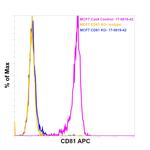
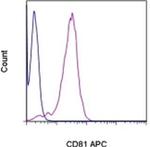
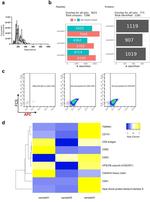
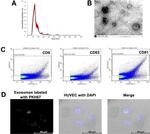
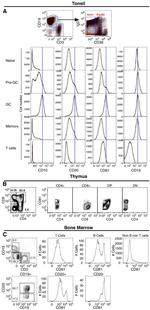
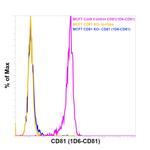
Product Details
17-0819-42
Species Reactivity
Published species
Host/Isotype
Recommended Isotype Control
Class
Type
Clone
Conjugate
Excitation/Emission Max
Form
Concentration
Purification
Storage buffer
Contains
Storage conditions
Shipping conditions
RRID
Product Specific Information
Description: This 1D6-CD81 monoclonal antibody reacts with human CD81, which is also known as Target of Anti-Proliferative Ab-1 (TAPA-1). A member of the tetraspanin superfamily of transmembrane proteins, CD81 is widely expressed on immune cells such as B, T, and NK cells, monocytes, and eosinophils. Studies suggest that the highest expression of CD81 can be found on germinal center B cells. This protein can also be detected on non-Hodgkin lymphomas and diffuse large B-cell lymphomas. On B cells, CD81 exists in a complex with CD19, CD21, and Leu13. CD81 plays a role in segregating the CD19/CD21-B cell receptor complexes to lipid rafts to activate signal transduction. Finally, CD81 is a receptor for hepatitis C virus.
The 1D6 monoclonal antibody has been reported to induce adhesion and reduce cell proliferation.
Applications Reported: This 1D6-CD81 antibody has been reported for use in flow cytometric analysis.
Applications Tested: This 1D6-CD81 antibody has been pre-titrated and tested by flow cytometric analysis of normal human peripheral blood cells. This can be used at 5 µL (1 µg) per test. A test is defined as the amount (µg) of antibody that will stain a cell sample in a final volume of 100 µL. Cell number should be determined empirically but can range from 10^5 to 10^8 cells/test.
Excitation: 633-647 nm; Emission: 660 nm; Laser: Red Laser.
Filtration: 0.2 µm post-manufacturing filtered.
Target Information
CD81 (TAPA-1, target of anti-proliferative antibody-1) is a member of the tetraspanin family, is expressed on virtually all nucleated cells, but above all on germinal center B cells. CD81 forms complexes with other tetraspanin proteins, integrins, coreceptors, MHC class I and II molecules, and influences adhesion, morphology, activation, proliferation and differentiation of B, T cells. In muscles, CD81 promotes cell fusion and myotube maintenance. CD81 has been also identified as a receptor for the hepatitis C virus. Like members of the tetraspanin family that include CD9, CD37, CD53, CD63, and CD82, CD81 is a cell-surface proteins that are characterized by the presence of four hydrophobic domains. The proteins mediate signal transduction events that play a role in the regulation of cell development, activation, growth and motility. CD81 is a cell surface glycoprotein that is known to complex with integrins. CD81 appears to promote muscle cell fusion and support myotube maintenance. CD81 associates with CD19, CD21, Leu 13, and integrins on cell membrane and acts as a receptor for the envelope protein E2 of chronic hepatitis C virus. Antibodies to CD81 have anti-proliferative effects on different lymphoid cell lines, particularly those derived from large cell lymphomas. CD81 is also localized in the tumor-suppressor gene region and is a candidate gene for malignancies.
For Research Use Only. Not for use in diagnostic procedures. Not for resale without express authorization.
How to use the Panel Builder
Watch the video to learn how to use the Invitrogen Flow Cytometry Panel Builder to build your next flow cytometry panel in 5 easy steps.
Bioinformatics
Protein Aliases: 26 kDa cell surface protein TAPA-1; CD81; CD81 antigen; CD81 antigen (target of antiproliferative antibody 1); Target of the antiproliferative antibody 1; Tetraspanin-28; Tetraspanin28; Tspan-28
Gene Aliases: CD81; CVID6; S5.7; TAPA1; TSPAN28
UniProt ID: (Human) P60033
Entrez Gene ID: (Human) 975

Performance Guarantee
If an Invitrogen™ antibody doesn't perform as described on our website or datasheet,we'll replace the product at no cost to you, or provide you with a credit for a future purchase.*
Learn more
We're here to help
Get expert recommendations for common problems or connect directly with an on staff expert for technical assistance related to applications, equipment and general product use.
Contact tech support

